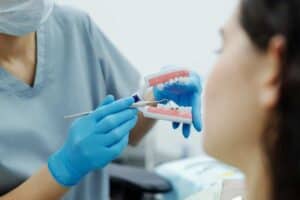
Oral surgery involves surgical interventions performed by oral surgeons or highly trained dentists who have undergone extensive education and clinical training. These specialists possess expertise in various aspects of oral and maxillofacial surgery, including dental implants, facial trauma, oral pathology, and corrective jaw surgery.
Oral surgery encompasses a wide array of procedures, tailored to address diverse oral health issues. Some of the most common procedures include:
Oral surgeons perform tooth extractions for various reasons, such as severe decay, advanced periodontal disease, or impacted wisdom teeth. Wisdom teeth, also known as third molars, often require surgical extraction due to impaction, which can lead to pain, infection, and dental misalignment.
Dental implants are titanium posts surgically inserted into the jawbone to replace missing teeth. Oral surgeons meticulously plan and execute implant placement, ensuring optimal function and aesthetics for the patient.
This corrective jaw surgery aims to correct abnormalities in the jawbones, such as misalignment or disproportionate growth. Orthognathic surgery not only enhances facial harmony but also improves chewing, speaking, and breathing functions.
An oral surgeon in Livonia can also diagnose and treat various oral diseases and conditions, including oral cancer, cysts, and tumors. Early detection and intervention are crucial for managing these potentially life-threatening conditions.
Among the various types of oral surgery procedures, wisdom teeth surgery stands out as one of the most prevalent. Wisdom teeth, the third molars that typically emerge in late adolescence or early adulthood, often pose problems due to impaction, inadequate space, or improper eruption angle. Some signs that you may need your wisdom teeth removed include:
Individuals experiencing discomfort or complications related to their wisdom teeth should consult with a nearby dentist to determine the best treatment. If wisdom teeth removal is recommended, your dentist in Livonia will work with you to make sure you get the best care possible.
During a wisdom teeth extraction procedure, oral surgeons will administer local anesthesia or sedation to ensure patient comfort. They then carefully remove the affected teeth through surgical techniques, which may involve sectioning the tooth into smaller pieces for easier extraction.
Following wisdom teeth removal, patients receive detailed post-operative instructions to promote optimal healing and minimize complications. This typically includes pain management, oral hygiene guidelines, dietary restrictions, and follow-up appointments to monitor recovery progress.
Oral surgery encompasses a diverse range of procedures aimed at addressing various oral health issues. Among these procedures, wisdom teeth surgery holds particular significance, offering relief from pain and preventing potential complications associated with impacted third molars.
We’re always welcoming new patients at our dental offices in Ann Arbor, Canton, Farmington Hills, and Livonia. Call the office nearest you to schedule an appointment.

Same-day dentistry, as the name suggests, involves completing dental procedures in a single visit to the dentist’s office, eliminating the need for multiple appointments and extended waiting periods. This approach leverages advanced technology and techniques to streamline the treatment process, offering patients the convenience of immediate results.
One of the most significant advancements driving same-day dentistry is CAD/CAM (Computer-Aided Design/Computer-Aided Manufacturing) technology. With CAD/CAM, dentists can create precise digital impressions of a patient’s teeth and design restorations such as crowns, bridges, or veneers with remarkable accuracy. These digital designs are then sent to an in-office milling machine, which fabricates the restoration from a block of ceramic material in a matter of minutes.
The advantages of same-day dentistry extend beyond convenience. For patients, it means spending less time in the dentist’s chair and avoiding the hassle of scheduling multiple appointments. It also reduces the need for temporary restorations, which can sometimes be uncomfortable or prone to damage.
Furthermore, same-day dental procedures often result in better outcomes. With CAD/CAM technology, restorations can be precisely customized to fit the patient’s bite and natural tooth color, ensuring optimal aesthetics and functionality. Additionally, because the entire process is completed in a single visit, there is less risk of contamination or damage to the restoration between appointments.
If you’re considering same-day dental procedures, finding a qualified provider is essential. Look for a dentist who specializes in restorative dentistry and offers same-day services using advanced technology like CAD/CAM. By choosing a skilled and experienced practitioner, you can ensure the quality and durability of your dental restorations.
Same-day dentistry plays a crucial role in restorative dentistry, encompassing a range of treatments aimed at repairing or replacing damaged or missing teeth. Whether you require a dental crown, bridge, or implant restoration, a skilled restorative dentist in Farmington Hills can address your needs efficiently and effectively. Using state-of-the-art technology and an eye for artistry, they can deliver exceptional results in a single visit, restoring both the health and appearance of your smile.
Same-day dentistry represents a shift in the way dental procedures are performed, offering patients unprecedented convenience and efficiency without compromising on quality. By harnessing the power of advanced technology and techniques, dentists can deliver comprehensive restorative care in a fraction of the time previously required.
We’re always accepting new patients at our dental offices in Ann Arbor, Canton, Farmington Hills, and Livonia.

Tooth-colored fillings, also known as composite fillings, are made from a mixture of glass or quartz filler and a resin medium. They are designed to match the natural color of your teeth, providing a more aesthetically pleasing solution for cavities, especially in visible areas of the mouth. These fillings are versatile and can be used for both small and large cavities, as well as for repairing chipped or broken teeth.
One of the primary advantages of tooth-colored fillings in Canton is their appearance. Unlike silver fillings, which can be obvious when you laugh or smile, tooth-colored fillings blend seamlessly with your natural teeth, making them virtually indistinguishable. This aesthetic appeal is particularly important for individuals concerned about the cosmetic aspect of dental work.
Moreover, tooth-colored fillings bond directly to the tooth structure, which helps to strengthen the tooth and restore its natural integrity. This bonding process also requires less removal of healthy tooth structure compared to silver fillings, preserving more of the natural tooth.
Another benefit of composite fillings is their durability. While they may not last as long as silver amalgam fillings, advancements in composite materials have significantly improved their longevity. With proper care and regular dental check-ups, tooth-colored fillings can provide years of reliable service.
If you’re considering replacing your silver fillings with tooth-colored ones, it’s essential to consult with your dentist in Canton. During your appointment, your dentist will assess the condition of your existing fillings and determine whether they need to, or can, be replaced. In some cases, silver fillings may still be functional or necessary and not be suitable for replacement.
If replacement is recommended, the process typically involves removing the old silver fillings and replacing them with tooth-colored composite fillings. Your dentist will carefully match the color of the composite material to your natural teeth for a seamless finish. The procedure is usually straightforward and can often be completed in a single visit, depending on the number of fillings being replaced.
When opting for tooth-colored fillings, it’s crucial to choose a skilled and experienced dentist who specializes in white fillings in Canton. A knowledgeable dentist will not only ensure that your fillings are placed correctly but also take into account factors such as tooth shade, texture, and shape to achieve the most natural-looking results.
Tooth-colored fillings offer a modern, aesthetically pleasing alternative to traditional silver fillings. With their natural appearance, durability, and ability to preserve tooth structure, they have become a popular choice for many patients seeking dental restorations. If you’re considering replacing your silver fillings with tooth-colored ones, consult with a reputable dentist in Canton to discuss your options and embark on the journey towards a brighter, healthier smile.
Our dental offices in Ann Arbor, Canton, Farmington Hills, and Livonia are always accepting new patients. Call the location nearest you to schedule an appointment.

Oral cancer screenings are painless and non-invasive examinations conducted by dental professionals to assess the mouth for signs of cancer or precancerous conditions. During the screening process, the dentist or dental hygienist carefully examines the mouth, lips, tongue, gums, throat, and surrounding tissues for any abnormalities, such as unusual lumps, lesions, or discolorations. Additionally, advanced screening techniques, such as fluorescence visualization or specialized dyes, may be utilized to aid in the detection of abnormal cells.
One of the primary reasons why oral cancer screenings are essential is the potential to detect cancer in its early stages when treatment is most effective. Oral cancer, like many other forms of cancer, often presents few noticeable symptoms in its initial phases. As a result, it can go unnoticed by individuals until it has advanced to a more severe and challenging-to-treat stage. By undergoing regular oral cancer screenings in Ann Arbor, individuals can catch abnormalities early on, enabling prompt intervention and increasing the likelihood of successful oral cancer treatment.
Several risk factors increase the likelihood of developing oral cancer, including tobacco use, excessive alcohol consumption, prolonged sun exposure, and human papillomavirus (HPV) infection. Individuals with a history of these risk factors are at a higher risk of developing oral cancer and may benefit significantly from regular screenings. Moreover, adopting healthy lifestyle habits, such as smoking cessation, limiting alcohol consumption, practicing sun safety, and maintaining a balanced diet, can help reduce the risk of developing oral cancer.
In cases where oral cancer is detected, timely intervention is crucial to achieving the best possible outcomes. Oral cancer treatment in Ann Arbor may involve a combination of therapies, including surgery, radiation therapy, chemotherapy, targeted therapy, or immunotherapy, depending on the type and stage of the cancer. By identifying oral cancer early through screenings, individuals can undergo appropriate treatment promptly, potentially reducing the need for extensive surgical procedures or aggressive therapies.
Oral cancer screening initiatives play a vital role in promoting community health and well-being. Regular screenings conducted by dental professionals help raise awareness about the importance of early detection and encourage individuals to prioritize their oral health. Furthermore, access to comprehensive oral cancer treatment ensures that individuals diagnosed with oral cancer receive timely and appropriate care, ultimately improving their prognosis and quality of life.
Essentially, oral cancer screenings are a crucial component of preventive healthcare that offers numerous benefits, including early detection, improved treatment outcomes, and reduced morbidity and mortality rates associated with oral cancer. By undergoing regular screenings and seeking oral cancer treatment in Ann Arbor when necessary, individuals can take proactive steps to safeguard their oral health and well-being. Remember, early detection saves lives, and together, we can make a difference in the fight against oral cancer.
We have dental offices in Ann Arbor, Canton, Farmington Hills, and Livonia. Call the office closest to you today!

The journey towards getting dental implants in Livonia typically commences with an initial consultation with your dentist. During this appointment, the dentist will evaluate your oral health, assess bone density, and discuss your medical history. This comprehensive assessment aids in determining whether you are a suitable candidate for dental implants.
Once deemed eligible, your implant dentist in Livonia will work with you to create a personalized treatment plan. This plan includes a detailed roadmap of the implant placement procedure, outlining the number of implants needed and the strategic positioning for optimal results. Advanced imaging techniques, such as 3D cone beam scans, may be employed to provide a precise visualization of the treatment area.
In cases where a damaged or decayed tooth is still present, extraction may be necessary before moving forward with dental implant placement. This step ensures a clean slate for the new implant and promotes optimal healing.
For individuals with insufficient bone density in the jaw, bone grafting may be recommended. This preparatory procedure involves adding bone material to the treatment area, enhancing stability, and creating a solid foundation for the dental implant.
The main event of dental implant placement is determining the precise surgical location for the implant. This is a meticulous procedure performed under local anesthesia. Your implant dentist will make a small incision in the gum tissue to expose the jawbone, drill a precise hole, and carefully place the implant into the bone. The incision is then stitched up, and the healing process begins.
After the implant is placed, a critical phase called osseointegration takes place. This is when the implant fuses with the surrounding bone, creating a strong and stable foundation. Osseointegration can take several weeks to months, during which the patient is advised to follow post-operative care instructions to ensure successful integration.
Once osseointegration is complete, a second minor surgery is performed to attach an abutment to the implant. The abutment acts as a connector between the implant and the prosthetic tooth, providing a secure anchor. This step is essential for customization, as the abutment is specifically tailored to accommodate the final restoration.
The final step in the dental implant placement procedure involves the attachment of the prosthetic tooth or crown to the abutment. The restoration is meticulously crafted to match the color, shape, and size of the surrounding natural teeth, ensuring a seamless and aesthetically pleasing result.
Restorative dentistry in Livonia, such as dental implants, can help patients get a smile that’s not only beautiful but also functional. While dental implant placement is a multifaceted procedure that requires surgical precision, advanced technology, and artistic craftsmanship, it can give you a healthier and more vibrant smile.
If you’re considering dental implants, reach out to us at one of our dental office in Ann Arbor, Canton, Farmington Hills, or Livonia. We’re always happy to help.

Loud, persistent snoring is a hallmark of OSA, and could be linked to dental problems. Issues like a misaligned jaw or a narrow airway due to dental factors might contribute to snoring. Those seeking sleep apnea treatment in Ann Arbor should get a comprehensive examination of dental structure and alignment.
Chronic fatigue is a common consequence of interrupted sleep caused by OSA. Additionally, individuals with sleep apnea often experience bruxism or teeth grinding during the night. Exploring oral appliances for sleep apnea in AnnArbor could be a viable alternative, as these devices help reduce the impact of bruxism, improving sleep quality.
Morning headaches and TMJ pain can also be indicators of OSA related to dental issues. A misaligned jaw can strain the TMJ, leading to discomfort. Oral appliances designed for sleep apnea can aid in repositioning the jaw, relieving pressure on the TMJ, and potentially alleviating associated symptoms.
OSA often leads to breathing through the mouth during sleep, causing dry mouth and throat irritation. Dental issues such as improper tongue posture or palate abnormalities may contribute to these symptoms. Seeking sleep apnea treatment should include addressing these dental concerns to enhance overall effectiveness.
OSA has been linked to hypertension and cardiovascular problems. Dental issues, such as malocclusion or a misaligned jaw, may exacerbate these conditions. Integrating oral appliances into your sleep apnea treatment plan could potentially contribute to better blood pressure management.
OSA can impair cognitive function and concentration. Dental problems, especially those affecting the airway and oxygen intake, can further contribute to these challenges. Considering oral appliances for sleep apnea treatment can be a vital step toward improving cognitive function and overall quality of life.
If you suspect your obstructive sleep apnea is linked to dental problems, seeking comprehensive sleep apnea treatment in Ann Arbor is essential. Incorporating oral appliances tailored for sleep apnea can provide a promising alternative to traditional CPAP therapy, addressing both the symptoms and potential dental factors contributing to the sleep disorder. Don’t hesitate to explore these innovative solutions for a more personalized and effective approach to managing obstructive sleep apnea.
We have four dental offices in Ann Arbor, Canton, Farmington Hills, and Livonia. Call the office nearest you to schedule an appointment.

Defining a Dental Emergency
A dental emergency refers to a situation where immediate professional intervention is required to alleviate severe pain, prevent further damage, or save a tooth. Understanding the signs of a dental emergency can help individuals seek timely care and prevent complications. Some common dental emergencies may include:
A persistent, throbbing toothache that disrupts daily activities may indicate a dental emergency. It could be a sign of an infection or a dental abscess, requiring urgent attention.
If a tooth is knocked out due to trauma or injury, seeking emergency dental care in Canton within the first hour increases the chances of successful re-implantation.
A cracked or broken tooth can cause immense pain and requires immediate attention to prevent infection or further damage.
Uncontrolled bleeding from the gums or any oral tissues may indicate a serious problem, such as advanced gum disease or an injury that needs immediate evaluation.
Losing a filling or crown can expose the sensitive inner layers of the tooth, causing pain and leaving it vulnerable to further damage. Seeking urgent dental care in Canton is crucial in such situations.
Importance of Urgent Dental Care
Prompt attention to dental emergencies is essential for several reasons:
Dental emergencies can also come with severe pain. Timely intervention by an emergency dentist can provide relief and prevent the pain from escalating.
Ignoring a dental emergency can lead to complications such as infections, abscesses, or further damage to the teeth and surrounding tissues. Timely treatment helps prevent these issues.
Quick action can make a significant difference in preserving oral health. Whether it’s saving a knocked-out tooth or addressing a severe infection, urgent dental care is key to maintaining a healthy smile.
Finding Emergency Dentists in Canton
When faced with a dental emergency, it’s crucial to know what to do and who to turn to for immediate assistance. If you find yourself in a dental emergency, contact your dentist in Canton for immediate assistance. They can help guide you in the next steps you should take to alleviate pain and address the issue promptly.
Understanding what qualifies as a dental emergency empowers individuals to seek timely care, preventing further complications and preserving oral health. Your dentist is here to help ensure that you receive the urgent dental care you need when it matters most.
Find one of our dental offices close to you. We have locations in Ann Arbor, Canton, Farmington Hills, and Livonia.

Step 1: Appointment Scheduling
The journey to a healthy smile begins with scheduling an appointment with a dentist in Livonia at least every six months. Dental cleanings are often recommended twice a year to ensure your oral health is consistently monitored and any potential issues are addressed promptly.
Step 2: Welcome and Assessment
Upon arriving at your dentist’s office, you’ll be warmly welcomed by the dental staff. An initial assessment will be conducted to gather information about your medical history, any changes in your overall health, and specific concerns or issues you may have with your oral health.
Step 3: X-rays and Diagnostics
To get a comprehensive view of your oral health, your dentist may take some X-rays. These images help identify any underlying issues, such as cavities, gum disease, or other abnormalities that may not be visible during a visual examination. The diagnostic procedures are tailored to each patient’s unique needs.
Step 4: Oral Examination
Once the diagnostic procedures are complete, your dentist will conduct a thorough oral examination. This involves checking your teeth, gums, tongue, and other oral tissues for signs of decay, inflammation, or abnormalities. The dentist will also assess your bite and jaw joint for any issues.
Step 5: Professional Dental Cleaning
The highlight of the appointment is the professional dental cleaning. However, it’s important that the other steps are completed before a cleaning so that your dental team can cater to your specific needs. During this step, a dental hygienist will use specialized tools to remove plaque and tartar buildup from your teeth and along the gumline, which is crucial in preventing cavities and gum disease, as even the most diligent at-home oral care routine may miss certain areas.
Step 6: Scaling and Polishing
To eliminate stubborn plaque and tartar, the dental hygienist will perform scaling, a process that involves carefully and gently scraping off these deposits from the teeth. Following scaling, the teeth are polished using a gritty paste and a rotating brush to remove surface stains and create a smooth, clean surface.
Step 7: Fluoride Treatment
In some cases, a fluoride treatment may be recommended, especially for patients at a higher risk of developing cavities. Fluoride helps strengthen the enamel, making it more resistant to decay. The treatment is usually applied topically in the form of a gel or varnish.
Step 8: Oral Health Education
As part of the comprehensive care, your dental team will provide personalized oral health education. This includes guidance on proper brushing and flossing techniques, advice on maintaining a balanced diet for optimal oral health and addressing any specific concerns you may have.
Step 9: Treatment Planning
If any dental issues are identified during the examination, your dentist in Livonia will discuss treatment options and develop a personalized treatment plan. This may include additional procedures, such as cavity fillings, periodontal therapy, or other necessary interventions to restore and maintain your oral health.
Step 10: Scheduling Follow-Up Appointments
Before leaving the office, you’ll schedule your next dental cleaning appointment. Regular follow-ups are essential to ensure that your oral health is consistently monitored and any potential issues are addressed promptly.
Dental checkups and cleanings are a fundamental aspect of maintaining a healthy smile. If you’ve ever felt uncomfortable at a dental office, rest assured that your local dentist is committed to providing top-notch care. By following these comprehensive steps, you can approach your next dental cleaning with confidence, knowing that you’re taking proactive steps toward optimal oral health. Remember, a healthy smile contributes to a healthier you!
Welcoming new patients at all of our dental offices in Ann Arbor, Canton, Farmington Hills, and Livonia.

The Flossing Conundrum: Before or After Brushing?
Many dental professionals emphasize the importance of both flossing and brushing in a comprehensive oral care routine. The order in which you perform these tasks, however, can impact the effectiveness of your efforts.
Floss Before Brushing
Flossing before brushing has its advantages, and it’s a strategy recommended by your dentist in Farmington Hills. When you floss first, you remove the plaque and debris lodged between your teeth and along the gumline. This clears the path for your toothbrush to access more surfaces of your teeth, allowing the toothpaste to reach areas that were previously obscured.
By dislodging particles with floss initially, you create a cleaner canvas for your toothbrush, maximizing its ability to scrub away plaque and bacteria. This method can be particularly beneficial for those with tight spaces between their teeth, as flossing beforehand can make it easier for the bristles of the toothbrush to reach every nook and cranny.
Why is Flossing Important?
Even though flossing is often overlooked, it is a crucial part of maintaining optimal oral health by removing plaque and debris from between teeth where toothbrushes can’t reach. Neglecting this step allows plaque to accumulate, leading to gum disease, cavities, and bad breath. Regular flossing not only prevents these issues but also promotes healthy gums, reducing the risk of gingivitis and periodontal disease. Moreover, it contributes to overall well-being, as poor oral hygiene has been linked to systemic conditions like heart disease and diabetes. Just a few minutes of daily flossing can make a significant difference, ensuring a brighter smile and a healthier, happier life.
Tips for an Effective Oral Care Routine
Even though many dentists recommend flossing before brushing, the ultimate key to a healthy smile is consistency. The most critical factor in maintaining good oral health is ensuring that you floss and brush daily, regardless of the order. After all, when it comes to preventing cavities, gum disease, and other oral health issues, consistency is key
Accepting new patients at all of our dental offices in Ann Arbor, Canton, Farmington Hills, and Livonia.
The Critical Link Between Oral Health and Heart Health
As February unfolds, it not only marks the celebration of love but also serves as a timely reminder that it’s Heart Health Month. While matters of the heart are often associated with emotions, there’s a lesser-known connection that demands our attention – the intricate link between oral health and heart disease. In fact, poor oral health can have a negative impact on the heart, and your dentist in Canton is dedicated to guiding you toward a healthier, happier you.
How is Oral Health Linked to Heart Health?
Surprising as it may be, the state of your oral health is intimately tied to the well-being of your heart. Research has shown, and continues to show, the connection between poor oral health and an increased risk of heart disease, emphasizing the need for oral hygiene practices.
Poor oral health can lead to the accumulation of harmful bacteria in the mouth, triggering inflammation and infections. The risks of this inflammation extend beyond the oral cavity, reaching the arteries and increasing the risk of heart disease, strokes, and other cardiovascular issues such as high blood pressure, clogged arteries, and heart attacks. Notably, a study revealed that individuals with severe gum disease were twice as likely to suffer from coronary artery disease than those with good gum health.
Maintaining Good Oral Hygiene Habits
Understanding just how connected oral health is with heart health shows the importance of maintaining good oral hygiene habits. Here are some key steps to take to protect your oral health and, consequently, your heart health:
Other Ways to Protect Your Heart
Besides taking great care of your oral health, there are other things you can do to help protect your heart such as:
As we navigate through Heart Health Month, and every month, let’s acknowledge the connection between oral health and heart health and take steps to help reduce the risk of cardiovascular disease and complications by incorporating heart-healthy habits into your lifestyle, including following a good oral hygiene routine.
We’re always accepting new patients at our dental offices in Ann Arbor, Canton, Farmington Hills, and Livonia.